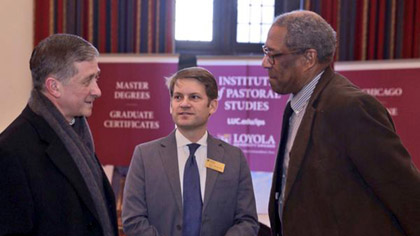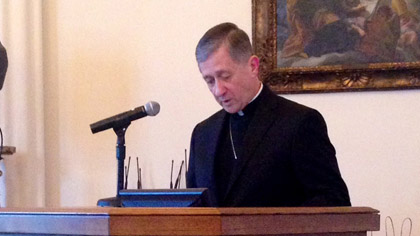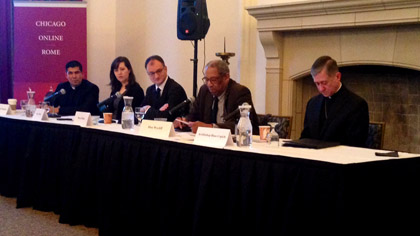New Digital Concentration for Pastoral Studies

| February 12, 2015 |
|---|
By Regina Merrill
Social media is absolutely necessary for anyone trying to reach a community on a mass scale, and the Catholic Church is not immune to this fact. In recognition of the church’s need to engage with its parishioners, Loyola is creating a new Digital Communication concentration within the Master of Arts in Pastoral Studies. This program combines courses from the School of Communication and Loyola’s Institute for Pastoral Studies. It is the first of its kind in the United States. The concentration will teach future pastoral leaders how to best use the communication tools at their disposal to reach a wide audience.
On Tuesday afternoon in Lewis Towers’ Beane Hall, the IPS hosted a panel discussion to introduce the new concentration. Opening remarks were given by Archbishop Blase Cupich, and Don Wycliff, distinguished journalist in residence at Loyola, acted as moderator. Panelists included Kerry Weber, the managing editor of the Jesuits' America Magazine in New York; Fr. Manuel Dorantes, the Holy See Press Office’s chief liaison for Spanish-speaking media, and Rocco Palmo, the voice behind the Whispers in the Loggia news blog site and a former US correspondent for the London-based international Catholic weekly The Tablet.

Archbishop Cupich began by discussing how rapidly changing technology not only affects the church, but humans in general. “A computer is not a magic box that makes people do evil…it increases our capacity to do good or evil as we choose.” He asked that people be aware of how it affects the human community, and said that “the church has a responsibility to promote the ethical issues of all media, old and new.” He noted that this is what is at the core of Loyola’s new program.
The panelists revealed the importance of the new digital media concentration by sharing their experiences with social media within their different professions.
Rocco Palmo said he’s seen cases of people who have been away from the church for 20 to 40 years, but returned because they have found the church online. “As Catholics, we really have to look at the tone of our engagement.” said Palmo. He feels that social media is what “announces the church to the world,” but that the ultimate goal of using it is to call people to the table. His work across various platforms is substantial, but he says that it’s worth it, because he can see the engagement the church has with a wide audience.
Mike Canaris, an attendee, said that he’s excited about how the program will create a dialogue between “the academic aspects of theological reflection with…creative ministry and pastoral care.”
Kerry Weber spoke about the shifts she has seen in communication during her time as an editor. She discussed how just because the Catholic community strives to deliver a consistent message, it doesn’t mean the means of doing so have stayed the same. She recognized that “we need to be where people are conversing,” that is, on social media. Using social media means they have to constantly be mindful of consumer’s needs, and she said that “they want to be a media ministry for others.”

Joyce Duriga, who was covering the panel for Catholic New World, the newspaper for the Archdiocese, said “we constantly hear from parishes, schools, organizations, that they want to be able to do this but they don’t have people on staff who know how to do it…so to be able to train the folks who are going into these ministries … is really fantastic and I think it’ll be just wonderful for the church on all kinds of fronts.”
Fr. Manuel Dorantes discussed how Catholics believe that the word became flesh, and said that it is “up to our generation to incarnate that word once again.” He also stressed the importance of authenticity within communication. Fr. Dorantes helped the Holy See’s press office gain popularity by tweeting material presented in the synod, and he spoke of the remarkable increase in engagement that it brought. The press office went from 500 followers to 9000 in a week. He also created a video for journalists to explain the synod. He said that journalists thanked him because a five minute video did what a “venerable cardinal couldn’t do in an hour and a half.”
At the end of the panel, Fr. Dorantes said that a “culture of encounter” is important. Social media allows this, not just through words, but through pictures and videos as well. He said that this is what allows people to see the joy of Catholics.
The new concentration will be open for enrollment in the fall of 2015.
